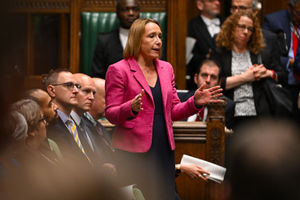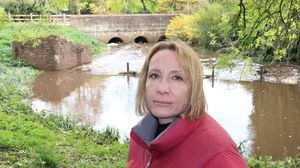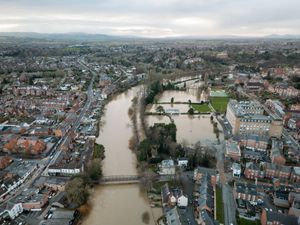Responses to flooding are 'often chaotic' says MP in plea to Government for better support
A Shropshire MP has criticised the official response to people's homes and businesses being flooded as "often chaotic".
North Shropshire MP Helen Morgan has called for better co-ordination in response for people who have been flooded, after learning the experiences of some her constituents in the region.
Speaking in a debate over planning and developer responsibilities with regards to flooding, Mrs Morgan also renewed her call for water companies to become statutory consultees in the planning process.
In March, she led a debate in Westminster Hall on the role of water companies in new housing developments, highlighting ongoing cases across her constituency where residents have suffered the consequences of "poor drainage networks".
It came after residents in Hadnall experienced raw sewage backing up into their toilets and manholes, and in some cases into their gardens, after heavy rain.

South Shropshire MP Stuart Anderson has also backed the calls and said new homes are being connected to outdated sewerage systems that are "proving inadequate".
Mrs Morgan said residents in Gobowen have suffered with issues due to flooding and require better responses to the incidents.
She also said it is hard for people to get insurance to cover flooding and that farmers are "hit badly" by flooding in the region.
She said homes built since 2009 are not covered by the remit of Flood Re, a joint initiative between the Government and insurers. Its aim is to make the flood cover portion of household insurance policies more affordable.
The North Shropshire MP has asked the Environment Secretary Emma Hardy MP to look at how the Sustainable Farming Incentive can be used to help farms store water upstream - preventing flood water from flowing downstream.
Speaking in Parliament, Mrs Morgan said: "When people are flooded either by surface or river water, the response is often chaotic. In Gobowen in my constituency, it is not clear who is responsible for closing the road. When vehicles drive through, there is a big bow wave, and the flooding in shops and homes becomes much worse. We need to better co-ordinate the response for people who have been flooded.
"Insurance is hard to get. Homes built since 2009 are not covered by Flood Re’s remit. The remit ends in 2030, leaving people stuck in potentially unsaleable and un-mortgageable homes. I know that the Minister is looking at Flood Re and its remit, so I would be grateful if she gave us a bit of an update.

"After people have been flooded, it is often hard to get help. The 'frequently flooded' criteria do not catch all homes in rural communities, because the density is not there. I know that the minister is looking at that, I would be grateful for an update.
"Farms are also hit very badly, and they are storing an enormous amount of water upstream. Will the minister be working with her colleagues in the department to consider how the sustainable farming incentive and similar plans might be used to help people to store water upstream and prevent flooding downstream?
"Finally, in the Planning and Infrastructure Bill, the Government are not taking the once-in-a-generation opportunity to deal with the increased likelihood of flooding. We have talked about having water companies as statutory consultees in planning, about implementing schedule three to the Flood and Water Management Act 2010 so that SuDS [sustainable drainage systems] have statutory guidance and are properly maintained, and about ensuring that houses are not being built in inappropriate places.
"The current guidelines do not achieve those objectives. I hope that the minister will work with her colleagues to make those requirements statutory."
Mrs Morgan is the chair of the All-Party Parliamentary Group on Flooding and Flooded Communities that is lobbying the Government for improved flooding policy.
The MP added: "Flooding is a huge issue for residents here in North Shropshire. People need to feel confident that their homes will not be severely damaged by flood water and that they will not be bankrupted by unaffordable insurance.

"Labour had the chance to deal with the increased likelihood of flooding, but the flood funding schemes are just as inaccessible as before and the Planning and Infrastructure Bill has totally missed the mark. The Government must step up to protect our rural communities from this flooding chaos."
Shrewsbury MP Julia Buckley also spoke in the debate and welcomed a recent multi-million cash injection to tackle the risk of flooding in Shropshire.
£16 million was allocated towards areas along the Severn and Wye rivers, and Shrewsbury and South Shropshire benefitted from more than £4.7 million of funding alone.

The Labour MP said she has secured an inquiry to examine flood preparedness and response.
"As the member for Shrewsbury, flooding is always a priority for me, as it is for my residents, businesses and local services, because our historic town is encircled by the beautiful yet powerful River Severn," Mrs Buckley said. "Some of my residents have been flooded over 20 times since 1998, and our active Shrewsbury Business Flood Action Group is providing valuable support for them. They often struggle to find affordable insurance to cope.
"I thank the Department for Environment, Food and Rural Affairs [DEFRA] for investing over £16 million this financial year in projects that protect communities such as mine all along the River Severn catchment.
"DEFRA already published new online data on the Government website in January that show the updated risk of flood from the combined sources of rivers, seas and surface water. For the first time, surface-water flooding is incorporated into that new national flood risk assessment, and that will help individual residents and businesses to know whether the risk is coming downstream or up through their drain gullies - or sometimes both.

"I have secured an inquiry through the Environmental Audit Committee to examine flood preparedness and response. It will look particularly at the fragmentation of responsibilities across many agencies, and its impact on budgets and on how we can best co-ordinate. I hope that we can provide some helpful recommendations to the Minister, and perhaps find some efficiencies and ways to work better together towards prevention rather than cure.
"As with the demonstrator projects along the River Severn, Shrewsbury is once again leading the way."





